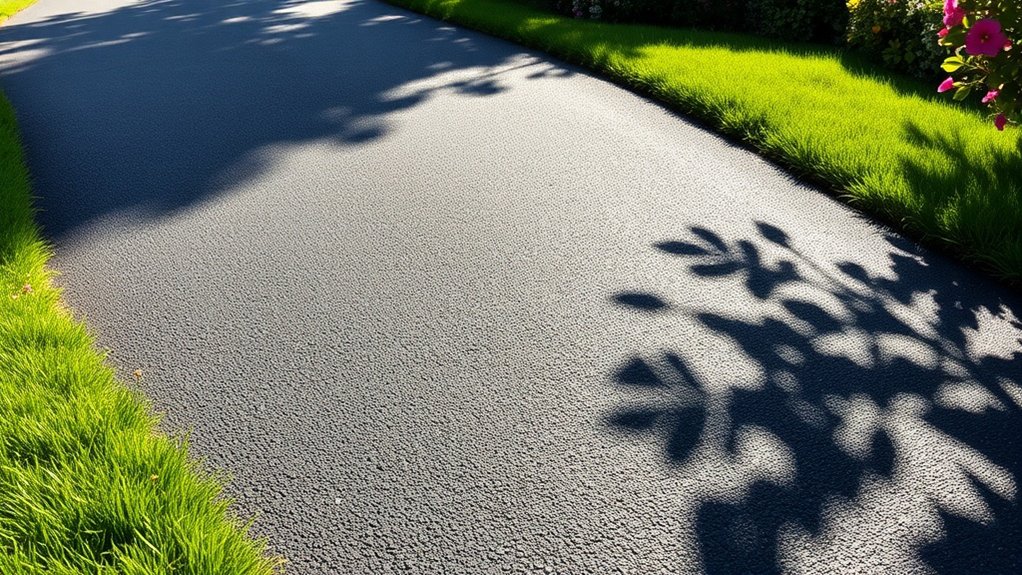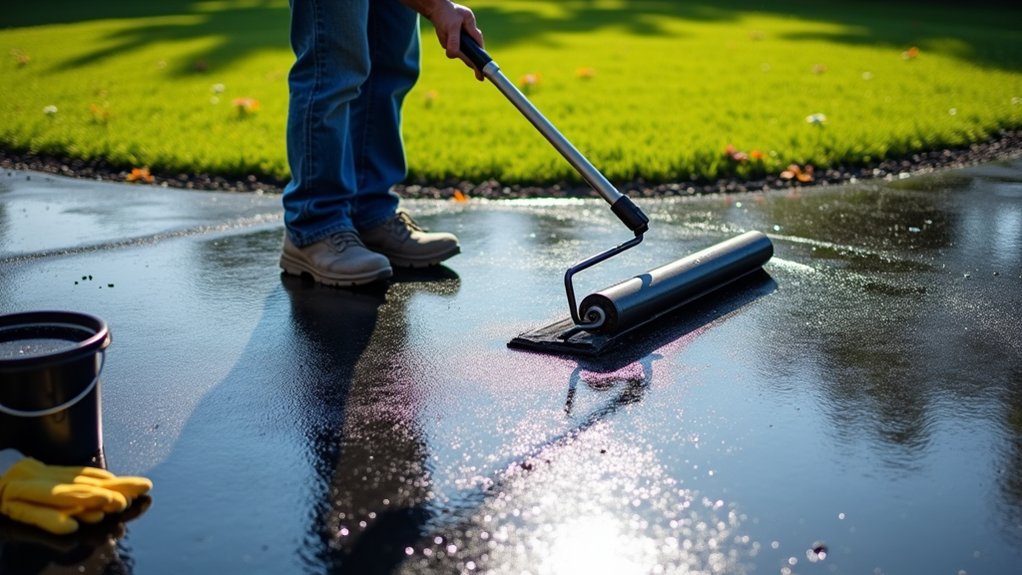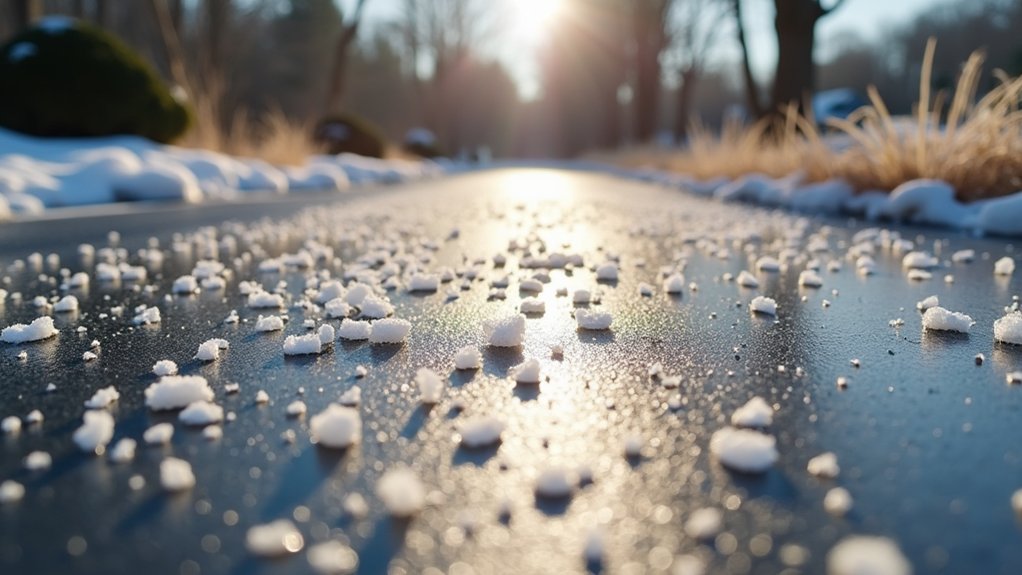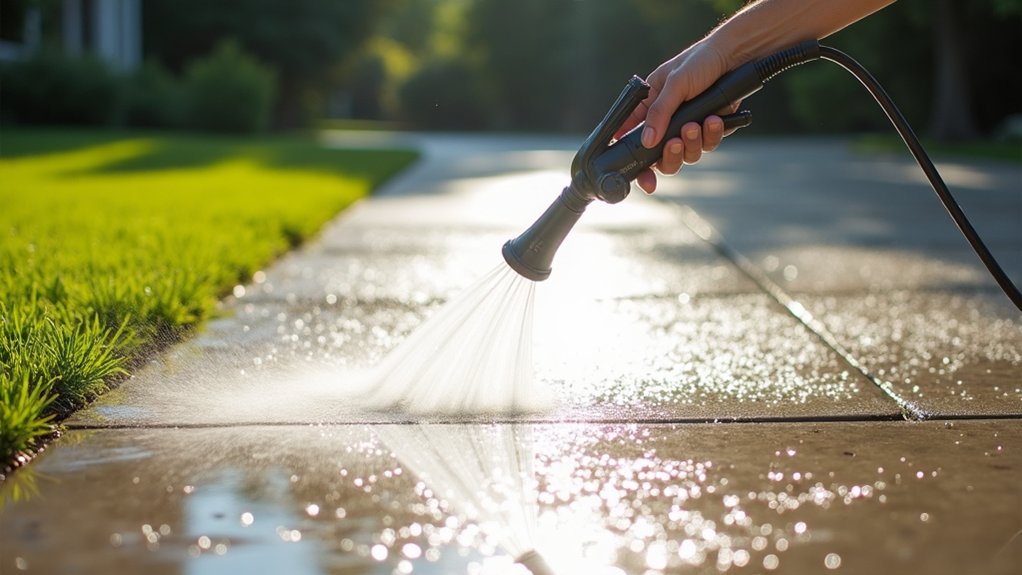The best non-slip driveway sealer improves traction and protects your driveway from the elements. Opt for penetrating sealers that preserve the natural texture of your surface while shielding it from moisture and chemicals. Advanced polyurethane and acrylic sealers work well in high-traffic areas. Consider your local climate and the specific needs of your surface to ensure optimal performance. For further insights into different types and application methods, there’s a wealth of information available!
Table of Contents
ToggleKey Takeaways
- Opt for a sealer that includes a non-slip additive or aggregate to improve grip, particularly in wet weather.
- Consider using penetrating sealers for long-lasting protection that maintains the natural look of your driveway.
- Look for eco-friendly, water-based sealers to reduce health risks and environmental impact while effectively repelling moisture.
- Ensure the chosen sealer is durable and resistant to chemicals to extend the life of your driveway.
- Regular upkeep, such as cleaning and resealing every few years, is crucial for preserving non-slip features and overall driveway condition.
Understanding Non-Slip Driveway Sealers
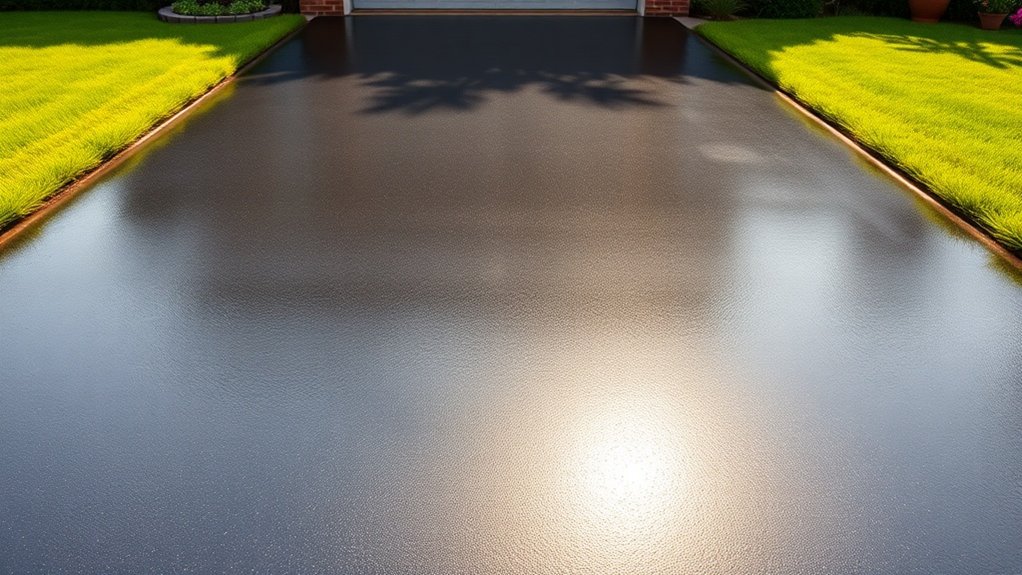
Non-slip driveway sealers are vital for improving safety and safeguarding your investment. These sealers offer significant slip resistance, particularly in wet weather, helping to prevent accidents.
You can apply the sealer with rollers or sprayers; rollers tend to penetrate cracks better, ensuring greater durability. Additionally, water-based sealers create a breathable film that protects against UV damage, moisture, and chemical spills while providing slip resistance.
By repelling moisture, these sealers protect your driveway from freeze-thaw damage and staining, ultimately extending its lifespan. It’s important to maintain your driveway, as sealers may need reapplication based on wear and environmental conditions.
Investing in a non-slip sealer not only boosts safety but also keeps your driveway looking good. With the right application, you can ensure a safer, longer-lasting surface that can withstand the elements effectively.
Types of Non-Slip Driveway Sealers
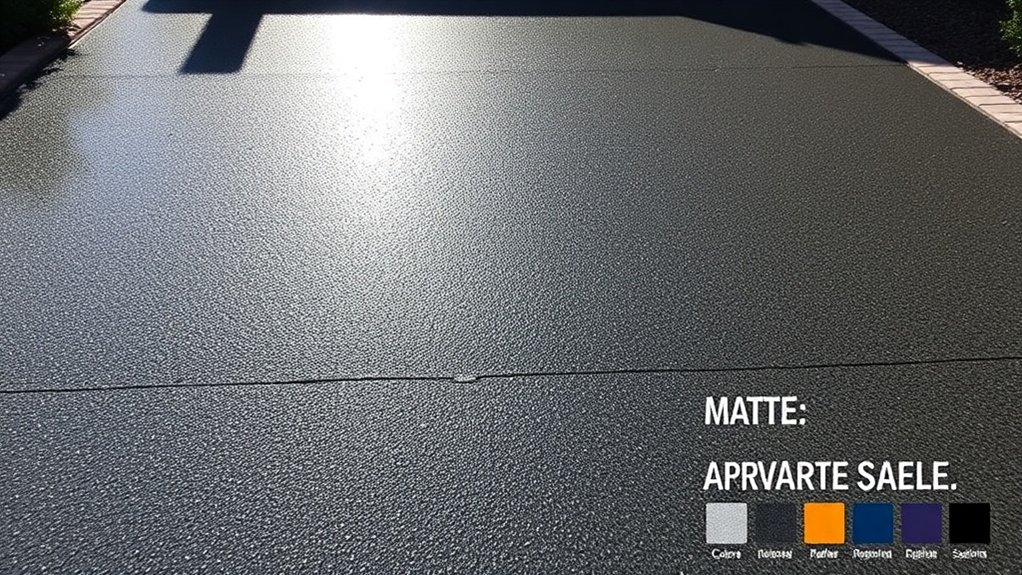
When selecting a non-slip driveway sealer, you have a range of effective options tailored to different needs.
Silane and siloxane sealers create a hydrophobic barrier, perfect for harsh weather, without changing the surface’s appearance. Additionally, these sealers offer long-lasting protection against water intrusion, making them ideal for freeze-thaw climates. They also help to prevent surface deterioration over time.
Coal tar sealers offer robust protection against chemicals but may face environmental restrictions and typically require professional application.
Asphalt emulsion sealers are water-based, eco-friendly, and can be reinforced with fibres for extra durability.
Acrylic sealers come in various finishes and often include non-slip materials, but they need to be reapplied periodically.
Lastly, advanced polyurethane, epoxy, and polyaspartic sealers provide thicker protection layers, ideal for high-traffic areas.
Always consider adding traction-boosting additives for enhanced safety.
Key Features for Slip Resistance
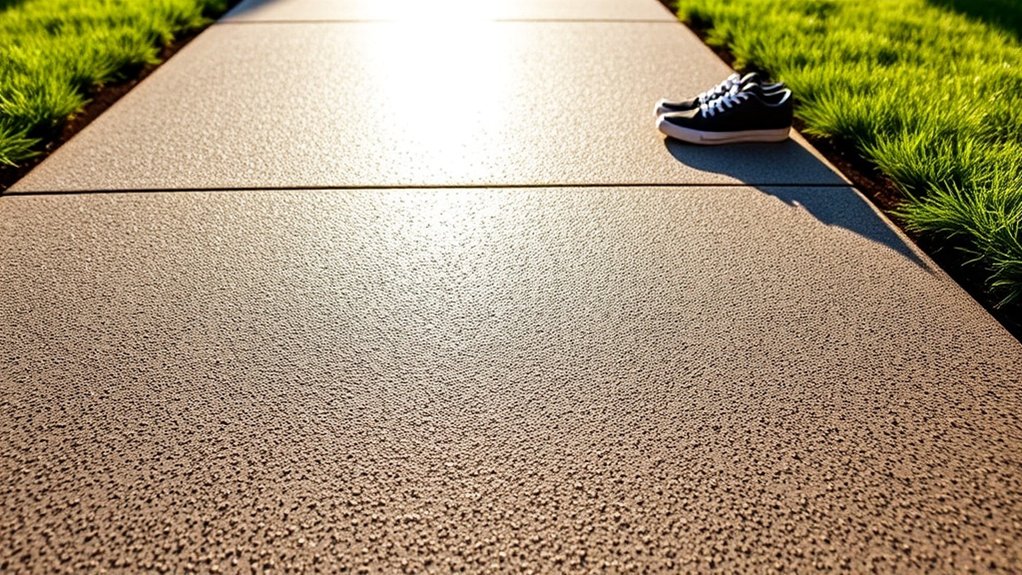
When selecting a non-slip driveway sealer, the texture of the surface is crucial for improving grip and safety. Look for a product that strikes a balance between breathability and moisture control to avoid water pooling, which can lead to slips. Familiarising yourself with these key features will help you make an informed choice for your driveway. Additionally, consider using a product that includes Non Skid additive, as it enhances traction on slippery surfaces without altering appearance.
Surface Texture Importance
Surface texture is crucial for improving slip resistance on driveways. Choosing the right materials and additives can significantly enhance traction, thereby reducing the risk of slips and falls.
Here are three key aspects to consider:
- Material Selection: Opt for aggregates or non-slip additives, such as OxiGrip, to increase surface roughness and grip.
- Surface Friction: A textured surface provides a better contact area for footwear, improving stability and minimising slips.
- Durability: Select non-slip sealers that are resistant to chemicals and compatible with different surfaces for lasting performance. Additionally, incorporating permeable surfaces can enhance drainage and reduce water accumulation, further improving slip resistance.
Breathability and Moisture Control
Breathability and moisture control are crucial features of non-slip driveway sealers that significantly affect slip resistance. Breathable sealers allow moisture vapour to escape, which helps prevent problems like blistering or scaling that can lead to slippery surfaces.
For effective moisture management, penetrating sealers such as silane and siloxane create water-repellent barriers while still allowing breathability. This is particularly important in areas with freeze-thaw cycles, where moisture can cause cracking.
Moreover, breathable sealers don’t form a slick film, helping to maintain your driveway’s natural texture for better grip.
Best Sealers for Freeze-Thaw and Salt Climates
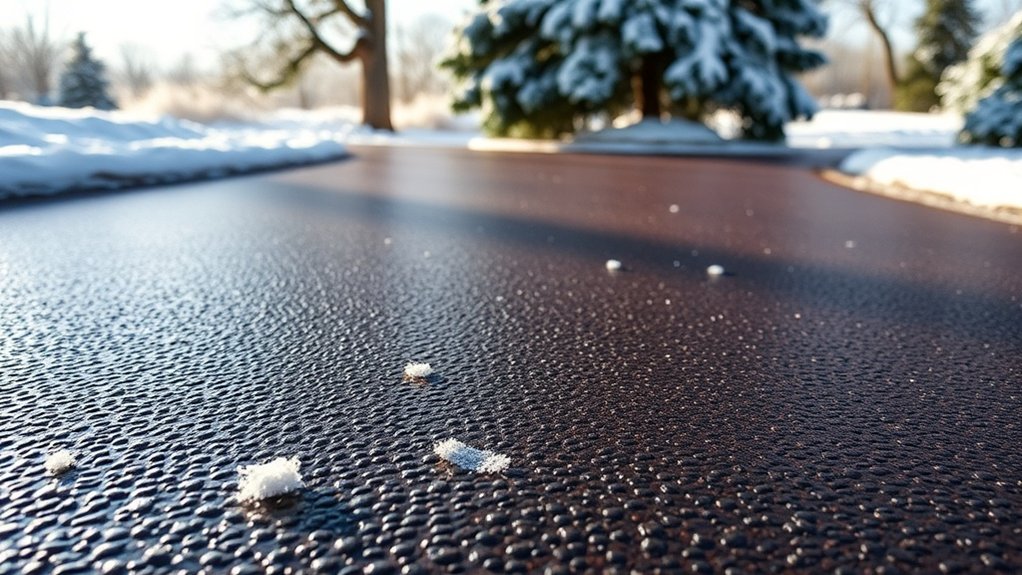
When selecting sealers for freeze-thaw and salt climates, penetrating sealers are an excellent option. They provide deep protection for concrete against moisture and salt damage.
These breathable sealers prevent water from getting in while allowing the surface to release moisture, significantly improving freeze-thaw resistance.
Penetrating Sealers Overview
Durability is crucial for driveways enduring harsh winter conditions, and penetrating sealers provide long-lasting protection against freeze-thaw cycles and de-icing salts.
When considering their application, pay attention to:
- Active Ingredient Concentration: Opt for sealers with at least 40% silane/siloxane for effective protection.
- Formulation Type: Solvent-based sealers penetrate deeper than water-based alternatives, offering superior durability.
- Surface Preparation Requirements: Penetrating sealers need less preparation compared to topical coatings, making them easier to apply.
In comparisons, silane/siloxane solutions are particularly effective at preventing water and salt damage while maintaining the concrete’s natural look. Additionally, using eco-friendly sealants can help protect the environment while ensuring optimal driveway protection. This makes them an excellent choice for safeguarding your driveway against the harsh effects of winter.
Breathable Sealers Benefits
If you’re keen to safeguard your driveway from the damaging effects of freeze-thaw cycles and road salts, breathable sealers are a top choice. These sealers form a hydrophobic barrier that boosts moisture resistance while preserving the surface’s integrity. They allow water vapour to escape, preventing moisture build-up that can cause damage. Here’s a quick comparison of benefits:
| Feature | Breathable Sealers | Other Sealers |
|---|---|---|
| Moisture Resistance | High | Moderate |
| Freeze-Thaw Protection | Excellent | Poor |
| Long-Term Maintenance | Minimal | Frequent |
| Surface Appearance | Natural Look | Glossy or Enhanced |
| Application Challenges | Requires a clean, dry surface | Easier to apply |
Opting for breathable sealers ensures your driveway can withstand the elements while keeping long-term maintenance to a minimum.
Freeze-Thaw Resistance Factors
To protect your driveway from the damaging effects of freeze-thaw cycles and road salts, it’s crucial to understand the key resistance factors in sealers.
Here are three essential factors for optimal sealer performance:
- Water-repellent ability: A good sealer should significantly reduce water absorption, preventing damage from freeze expansion.
- Salt resistance: Opt for sealers that effectively block salt intrusion, especially if your driveway is exposed to de-icing salts.
- Penetration depth: Choose deep-penetrating sealers to ensure freeze-thaw protection reaches throughout the concrete pores, not just on the surface.
Selecting a sealer with these features can prolong its lifespan and minimise maintenance, keeping your driveway safe and durable against freeze-thaw cycles and road salts.
Environmental and Health Considerations
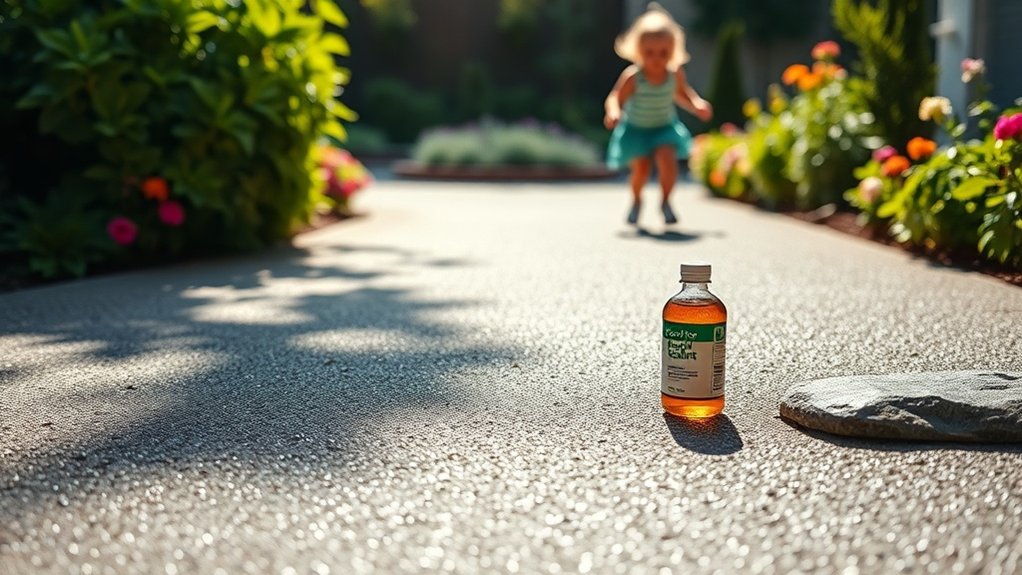
When sealing your driveway, it’s crucial to consider the environmental and health effects of the products available.
Coal tar-based sealers are particularly concerning due to their high levels of carcinogenic polycyclic aromatic hydrocarbons (PAHs), which can be harmful to both people and wildlife. For instance, children can be exposed through inhalation or skin contact. As a result, several regions, including parts of the UK, have introduced regulations to ban these harmful sealers.
In contrast, modern asphalt-based and water-based sealers are safer options. They contain lower levels of volatile organic compounds (VOCs) and PAHs, making them more environmentally friendly and compliant with regulations.
Choosing these alternatives not only reduces health risks but also provides a more sustainable solution for your driveway sealing needs.
Durability and Longevity of Sealers
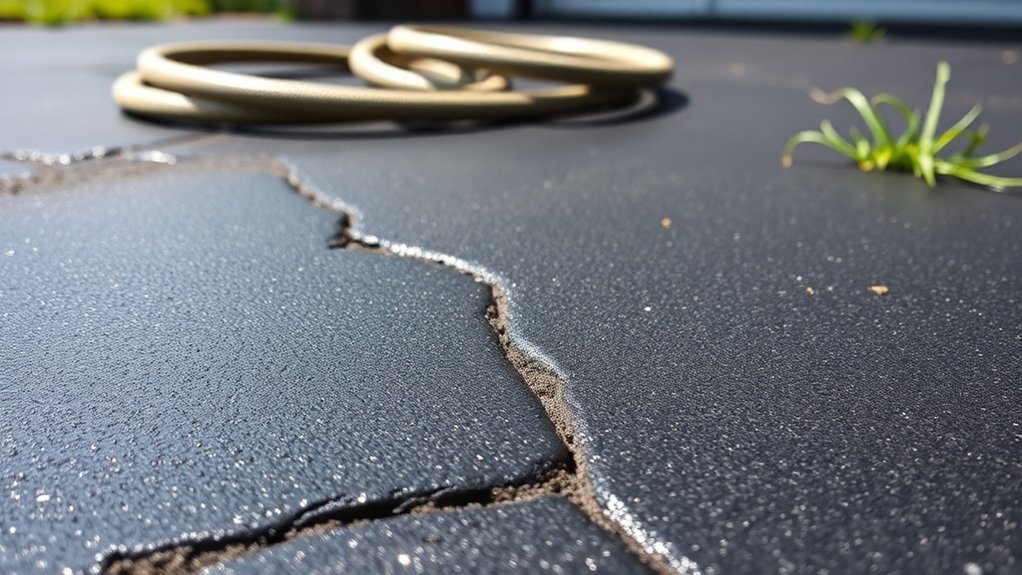
Selecting a sealer that offers both safety and performance is just the beginning; it’s crucial to grasp the durability and longevity of these products for the upkeep of your driveway.
Consider the following when choosing a sealer based on performance:
- Type of Sealer: Coal tar-based sealers typically last between 3-5 years. Penetrating sealers can last 3-7 years, with premium options sometimes reaching up to 10 years.
- Environmental Factors: Weather and traffic conditions significantly influence the longevity of your sealer. Extreme weather can reduce its lifespan.
- Maintenance: Regular inspections and cleaning can prolong the life of your sealer. Reapplication schedules vary, so plan ahead to ensure ongoing protection.
Application Techniques for Optimal Performance
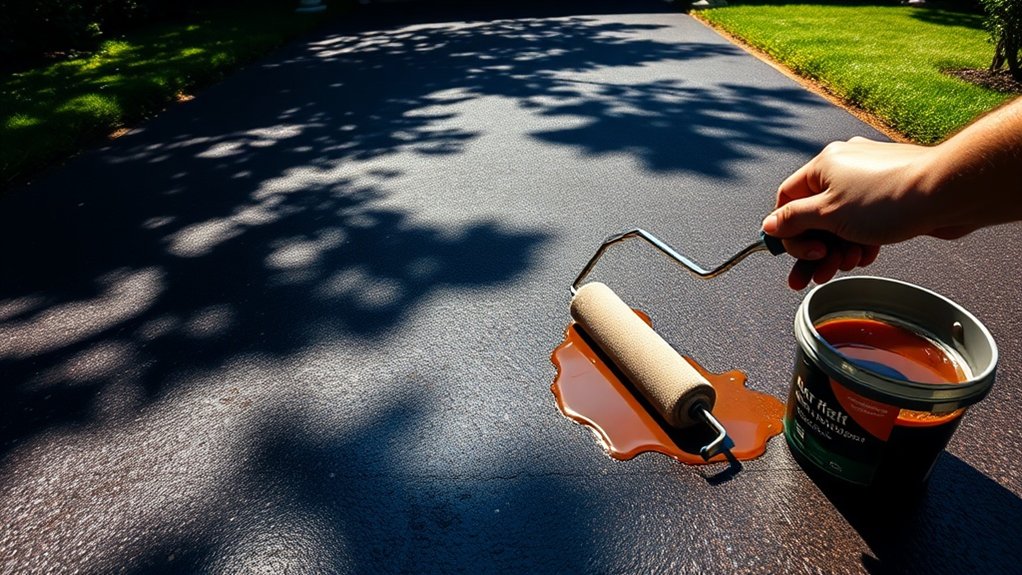
Proper application techniques are crucial for achieving the best performance with your non-slip driveway sealer.
Start by preparing the surface: clean it thoroughly to remove any debris and stains. Ensure it’s completely dry before making repairs, filling in any cracks and potholes.
When it comes to applying the sealer, use thin coats on manageable sections to prevent puddling. For edges, a brush works well, while a roller or sprayer is ideal for larger areas.
Remember to back-roll immediately to ensure an even distribution. Always conduct a test patch to assess adhesion and slip resistance.
Avoid applying too thickly; a single coat is usually enough for most driveways. Following these steps will maximise the performance and longevity of your sealer.
Comparing Penetrating vs. Surface Sealers
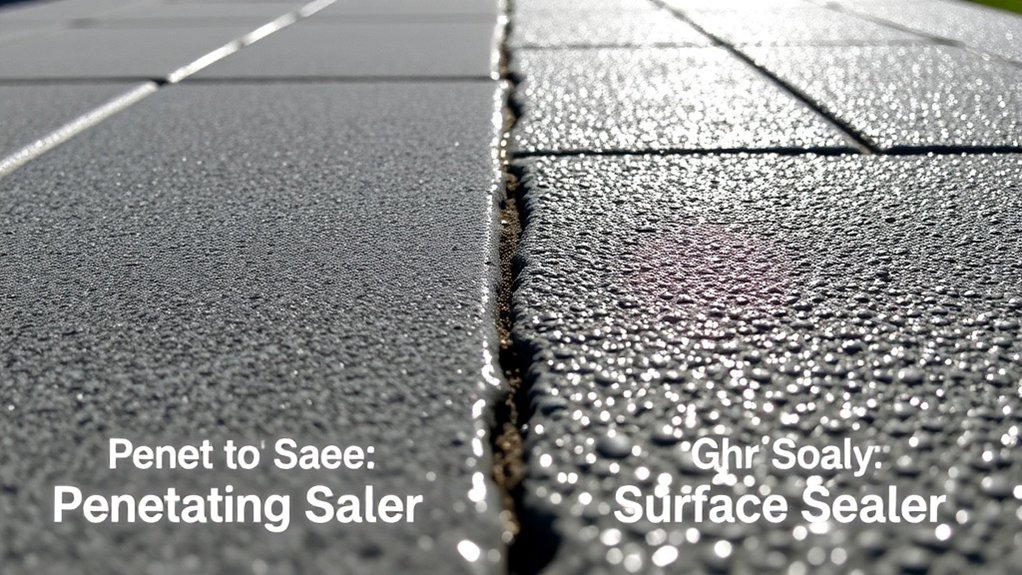
When deciding between penetrating and surface sealers, it’s important to know their key differences.
Penetrating sealers protect from within while preserving the natural texture of the concrete, making them great for durability and slip resistance. For example, if you have a driveway that experiences a lot of foot traffic, a penetrating sealer would be ideal.
In contrast, surface sealers improve the appearance but might reduce grip, which could be a concern in wet conditions.
Understanding their performance and application methods will help you choose the right option for your driveway.
Sealant Types Overview
When it comes to sealing driveways, both penetrating and surface sealers provide protection, but they function differently and have unique features. Here’s a brief comparison:
- Penetrating Sealers:
- They penetrate the material, blocking water, oil, and chemicals while maintaining the driveway’s natural look.
- They’re breathable, which helps prevent mould and mildew.
- Surface Sealers:
- They apply a protective layer on top, enhancing colour and giving a glossy finish.
- They offer immediate stain resistance but may peel or flake over time.
When choosing a sealing method, think about how each type affects both protection and appearance.
Penetrating sealers tend to offer long-lasting benefits without compromising slip resistance, while surface sealers focus more on aesthetics and quick protection.
Select based on your specific driveway requirements!
Performance and Durability
Understanding the performance and durability of penetrating versus surface sealers is crucial when selecting the right option for your driveway. In terms of longevity and maintenance, penetrating sealers tend to outperform surface sealers. They effectively guard against water, salt, and chemicals while allowing moisture to escape, which helps to minimise the risk of mould. On the other hand, surface sealers provide better stain protection but need to be reapplied more frequently.
| Feature | Penetrating Sealers |
|---|---|
| Durability | Longer-lasting, less frequent reapplication |
| Protection Level | Prevents deep water penetration |
| Surface Appearance | Natural finish |
| Cost-Effectiveness | More cost-effective in the long run |
Ultimately, the right sealer for you will depend on your individual needs and the conditions of your driveway.
Application Techniques Differences
To effectively apply either penetrating or surface sealers, it’s important to use different techniques for each type. Here are three key application methods for optimal results:
- Tools: For penetrating sealers, use a low-pressure pump sprayer, while a 9” nap roller is best for surface sealers. After spraying, back-roll to minimise any puddles.
- Application Process: Work in manageable sections and keep a wet edge. Avoid puddling with penetrating sealers, and apply thin coats with surface sealers to prevent peeling.
- Drying Time: Penetrating sealers dry quickly, allowing for foot traffic shortly after application, whereas surface sealers take longer to dry. Always refer to the manufacturer’s guidelines for specific information.
Maintenance Tips for Long-Lasting Results
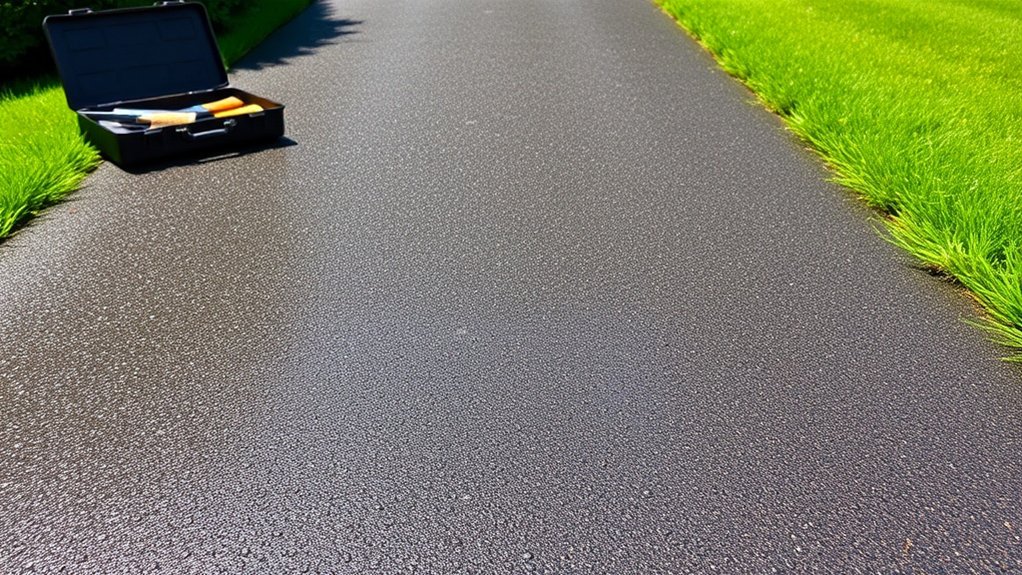
Maintaining your non-slip driveway sealer is crucial for achieving long-lasting results. Clean the surface every 1–2 weeks to keep its non-slip properties intact and prevent dirt accumulation. Use pH-neutral cleaners to avoid damaging the sealer and maintain grip. Act quickly to wipe up spills to prevent stains.
Reseal your driveway every 2–5 years to extend its life, and consider adding slip-resistant materials. Regularly check for cracks and fix them promptly to reduce slip risks.
In winter, steer clear of harsh de-icing chemicals; use sand instead for traction and to protect the sealer. Keep an eye on your driveway throughout the seasons to tailor your maintenance routine based on wear and weather exposure, ensuring it performs well all year round.
Selecting the Right Sealer for Your Driveway
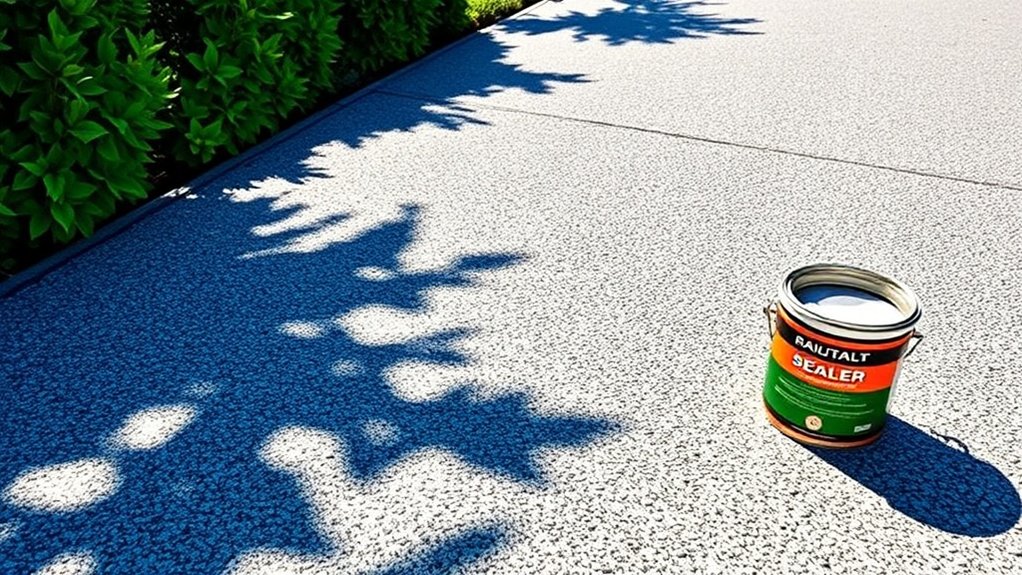
Choosing the right sealer for your driveway is crucial for its durability and overall performance. When comparing sealers, consider the following:
- Type of Sealer: Oil-based sealers adhere well but lack UV protection. Acrylic sealers are more durable and offer UV resistance, while asphalt emulsion is eco-friendlier but may not last as long.
- Application Tips: Always check the weather before applying, as proper curing conditions are essential. Acrylic sealers usually require professional application to avoid problems, while oil-based sealers may need special equipment.
- Environmental Impact: Be aware of local regulations regarding coal tar sealers, which may be restricted due to health concerns.
Frequently Asked Questions
How Do I Choose the Right Color for My Driveway Sealer?
To select the right colour for your driveway sealer, think about your home’s exterior and architectural style. Consider options like charcoal grey for a modern look or traditional red for a classic touch. It’s wise to test samples first to ensure they enhance your driveway’s appearance and keep it looking appealing.
Can I Apply a Non-Slip Sealer Over an Old Surface?
Yes, you can apply a non-slip sealer over an old surface. Just ensure you properly prepare the surface and check for compatibility. Use suitable sealing techniques, and it’s wise to test a small area first to achieve the best results.
What Are the Costs Associated With Sealing a Driveway?
Sealing a driveway can give it a polished look, but it usually costs between £200 and £600. Think about the long-term savings that come from regular maintenance, as this can make your investment worthwhile over time.
How Long Does It Take for a Sealer to Dry Completely?
Drying times for sealers can differ based on the type used. Solvent-based sealers typically dry in 2 to 6 hours, while water-based sealers usually take around 24 hours. However, complete curing can take anywhere from 7 to 28 days, depending on the conditions.
Are There Any Specific Weather Conditions to Avoid During Application?
When applying, steer clear of high humidity and extreme temperatures. Rain can spoil your work, while strong winds can affect even coverage. It’s crucial to ensure the right conditions for a long-lasting, effective non-slip surface.
Conclusion
When selecting the best non-slip driveway sealer, you’re not only prioritising safety but also extending the life of your driveway. Consider whether you want a penetrating or surface sealer, ensuring it matches your local climate and specific requirements. Proper application is essential, and regular maintenance will keep your driveway slip-resistant for years. By choosing the right product, you’re investing in your family’s safety and enhancing your home’s appearance. Make an informed decision!
Keep your driveway looking pristine with our step-by-step guide to sealing, complete with pro tips that will transform your approach!
On a resin driveway, rock salt can be effective for ice management, but could it also cause unforeseen damage? Discover Read more
Get ready to transform your driveway with pressure washing techniques that protect your surface—discover the essential steps to avoid damage!

